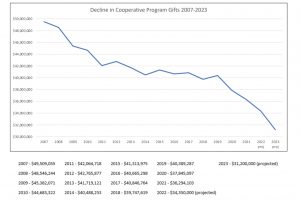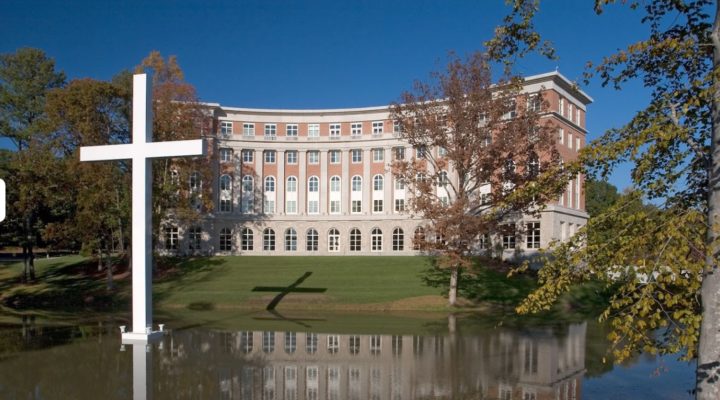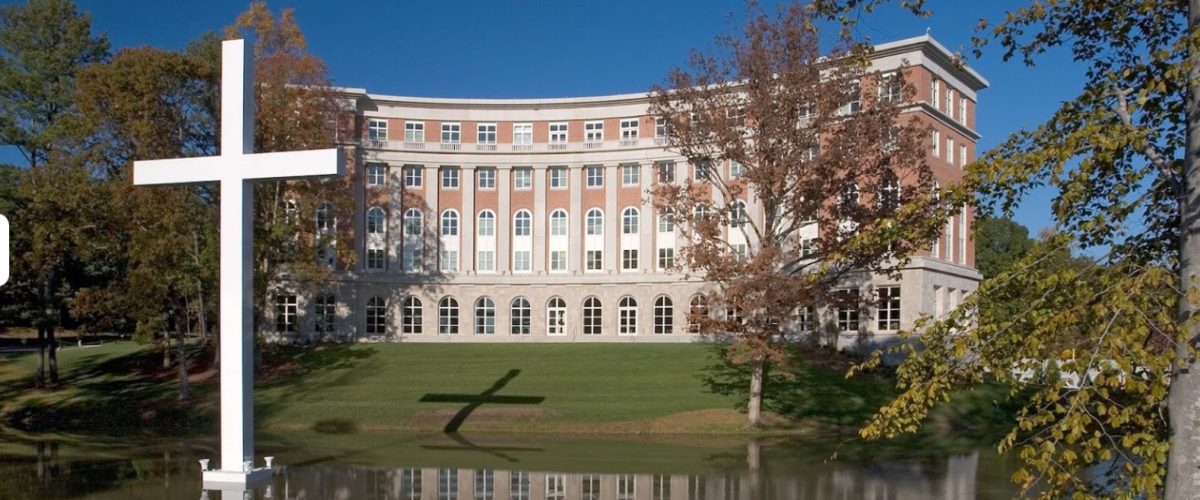The Georgia Baptist Mission Board, once the largest Southern Baptist state convention east of the Mississippi River, has sold its headquarters building for half its original $42.3 million cost. The state convention announced the sale on Jan. 4 without disclosing the 50% loss of equity.
The sale coincides with the downsizing of the ministry that began in 2019 and has resulted in nearly 75% reduction of staff and scaled-back ministries. The building, which housed nearly 300 staff at its 2006 dedication, only housed about 30 a year ago.
A boutique hotel developer purchased the site for $23.5 million and was the first offer in recent years that did not include demolition of the building. Other offers included total redevelopment of the site with a blend of luxury townhomes and retail but ran into issues with the county zoning commission.
The building site was cobbled together from multiple lots of prime real estate across from the county’s Chamber of Commerce and massive convention center and entertainment complex. As the years passed, the property appreciated in value, many times in direct correlation for calls to offload the property.

Aerial view of Georgia Baptist Mission Board property.
A White Elephant
The structure admittedly had a checkered past, simultaneously hailed as the Crown Jewel of state Baptist convention office buildings with its state-of-the-art electronics built for the internet age and high-tech “smart building” energy saving technology. But a growing crowd of critics decried the structure for its opulence and referred to it as a White Elephant.
Within the past decade, observers said it could possibly sell for nearly $65 million and said it would make the perfect fit for a national or regional headquarters for a major corporation. Indeed, at one time it was under review by a large corporation based out of the Northeast.

Thomas Hammond
Even if the value of the site fell as much as $15 million — an unheard-of drop at the time — a sale would have generated a nearly $8 million return on the original investment based on a $50 million sale.
Such a coup would have resulted in celebratory pats on the back all the way around in the Baptist world. But the one-two punch of a failed massive expansion of the property across the street and the national COVID shutdown collapsed the demand for the office real estate market.
As recently as two years ago, Gwinnett County appraised the site at $37.6 million ($30.5 million for the structure and $7.1 million for the land), according to the Atlanta Journal-Constitution. That value, considering the collapse of the corporate real estate market, was a slight drop of $4.7 million below its original appraised value. The sale announced earlier this month still came in at $14.1 million below that value, resulting in a heavy loss to the investment of Georgia Baptists who funded it through their giving.
Attempts to sell since 2019
When Thomas Hammond succeeded retiring Executive Director J. Robert White in January 2019, he immediately launched an aggressive campaign to sell the property as a cornerstone of his administration. He traveled the state referring to the structure as the Taj Mahal and blamed the former administration for questionable spending habits — even though the building had been approved by the board’s top-level Administration and Executive Committees as well as by messengers at four annual meetings.

David Melber
In spite of the financial loss, Board spokesman David Melber gave God the credit for the timing of the long-awaited deal.
“This entire process proved to be an exercise in our faith in the Lord to yield to his timing and his plans,” he said. “I believe without question God brought this buyer with their specific plans at this specific time that would allow the sale to be completed.
“God orchestrated all the details to come together without question,” he told readers of the state paper, The Christian Index.
A changing market
The five-story, 175,000 square-foot building was launched to great fanfare 18 years ago and was built in an era when churches also were engaged in massive building programs. The drive for larger sanctuaries and accessories like family life centers and sports amenities were justified as tools for evangelistic outreach.
But the national building boom that fueled projects such as that in Georgia did not continue. Shortly after its 2006 construction, the Great Recession of 2008 roiled the nation. Georgia was especially hard hit and posted an unemployment rate of 21% — among the highest in the country. As budgets tightened and churches cut back on giving, the entity began a round of budget cuts from which it never fully recovered.
 The 2008 budget, a record $52.3 million, never was surpassed and was quicky trimmed by $2.7 million the following year — ushering in an austere era of budget and staff reductions. Sentiment on the building soured as churches struggled to meet their own budgets, much less fund those of state and national entities.
The 2008 budget, a record $52.3 million, never was surpassed and was quicky trimmed by $2.7 million the following year — ushering in an austere era of budget and staff reductions. Sentiment on the building soured as churches struggled to meet their own budgets, much less fund those of state and national entities.
Since that high water mark, Georgia Cooperative Program giving has collapsed by $18.9 million to land at projected $33.4 million for 2024 — coincidentally mirroring the $18.8 million loss in the sale of the building.
Pressure to sell just six years after construction
By March 2012, only six years after the staff had moved into the Duluth property, Index Editor Gerald Harris reported the Georgia Baptist Executive Committee had voted to entertain any valid offers for a potential sale of the property. The ongoing slumping economy — led by a 54% drop in the stock market in 2009 — was cited as partial blame to offload the property.
Georgia Baptist officials, seeking to maximize the return on their investment, chose to avoid listing the property with real estate brokers to avoid paying substantial commission fees, a tactic rejected by the current administration.
Then two years ago in January 2021, Harris, then retired, wrote in the Index that the administration had contracted with JLL, “a world leader in real estate services, to market the Duluth property on a comprehensive scale.” The company’s fee was not disclosed.
In announcing the sale this month, The Index noted that Melber had spent the past four years as Hammond’s chief operating officer working with brokers to find a buyer.
A well-known roadblock is that the county zoning commission demanded more retail space in any redevelopment of the property, which would generate more taxable income. As a nonprofit, the Georgia convention did not provide the fast-growing county with appreciable tax revenue. Melber acknowledged the new purchaser, JMS Family Companies of Duluth, was the first developer with an offer to repurpose the building as an upscale boutique hotel rather than building a mixed-use development of housing and retail.
In announcing the sale, Hammond told readers of The Index: “We will immediately begin looking for a new administration building that will be able to handle the daily work of the GBMB staff.”
2023: Year of the double whammy

Current rented headquarters for Georgia Baptist Mission Board
Melber told the Journal-Constitution in a story last year it cost about $1.3 million a year to occupy the property. Therefore, he reasoned, moving to less expensive temporary space would free up more money for missions. So in December 2022, with fingers crossed pending another sale, administrative staff were relocated to a Suwanee industrial office park. Remaining staff were temporarily relocated to Hebron Baptist Church in Dacula.
But when that highly anticipated sale collapsed in the spring, the agency was saddled for the entirety of 2023 with costs of both the empty headquarters building and paying rent in the office park.
The Georgia Baptist Missions and Ministry Center, as it was known, had been debt free since 2015 when the Georgia Baptist Health Care Ministry Foundation stepped in and paid off the remaining $25 million debt.
Ongoing staff reductions rival other state conventions
While other state conventions have been hobbled with staff reductions in recent years, nothing approaches that of Georgia. Since January 2019, staffing levels have been reduced by more than 75%, surpassing the Florida Baptist Convention which reduced staff by 47% in 2015.
Even a $3.2 million loan through the COVID-inspired federal Payroll Protection Plan to subsidize salaries and maintain staffing levels did not help stave off further staff and ministry reductions.
Although Georgia Baptists are now relieved of the building, in his early tenure Hammond sought — and gained approval from messengers — to decide how any proceeds would be used. Such a vote in their November 2019 annual meeting avoided any future political posturing over how the funds could be dispersed.
According to an article in The Christian Index at the time, 75% of the proceeds were earmarked “to be set aside in an endowment for strengthening churches, encouraging pastors and pushing back lostness in Georgia and around the world.”
The remaining 25% is set aside “to relocate staff offices and construct a new, far smaller office building.”
In announcing the sale earlier this month, Hammond harkened back to the wisdom of that early decision. “This will be an investment over the years of millions and millions of dollars for kingdom work,” he explained. “The proceeds from the money endowed will be used in a variety of ways to serve our pastors and churches until Jesus comes back.”
Years of financial losses might be turning the corner for the state convention for the first time in decades. At the November annual meeting, Melber announced a 4.2% increase in Cooperative Program giving — what he described as “the largest projected increase in the Georgia budget in over 25 years.”
He also acknowledged a $2 million surplus in the just-ended 2023 budget.
But rather than channeling the overage back into Georgia ministries to shore up chronic losses, the administration chose to redirect $300,000 to the Southern Baptist Convention’s North American Mission Board in addition to $9.5 million already contributed through the Annie Armstrong Missions Offering. The balance of the overage —1.7-million — was handed over to the SBC International Mission Board in addition to $16.5 million already contributed through the Lottie Moon Offering.
In 2007, the same year the state convention posted its record $52.3 million budget, it welcomed 62 new churches and missions. At its most recent meeting it reported 17 new congregations.
The gift to NAMB will be earmarked exclusively for church planting in Georgia.
NAMB never has disclosed how many churches it has started in Georgia or any other state for the past 20 years, how many church planters are in every state, or where they serve. It is unknown if the agency will make an annual public report to the Georgia Baptist Mission Board as to how the funds are being used.
Related articles:
Georgia Baptist Mission Board to vacate property and move into a local church
Georgia Baptists hit snag on sale of 16-year-old headquarters property in suburban Atlanta


